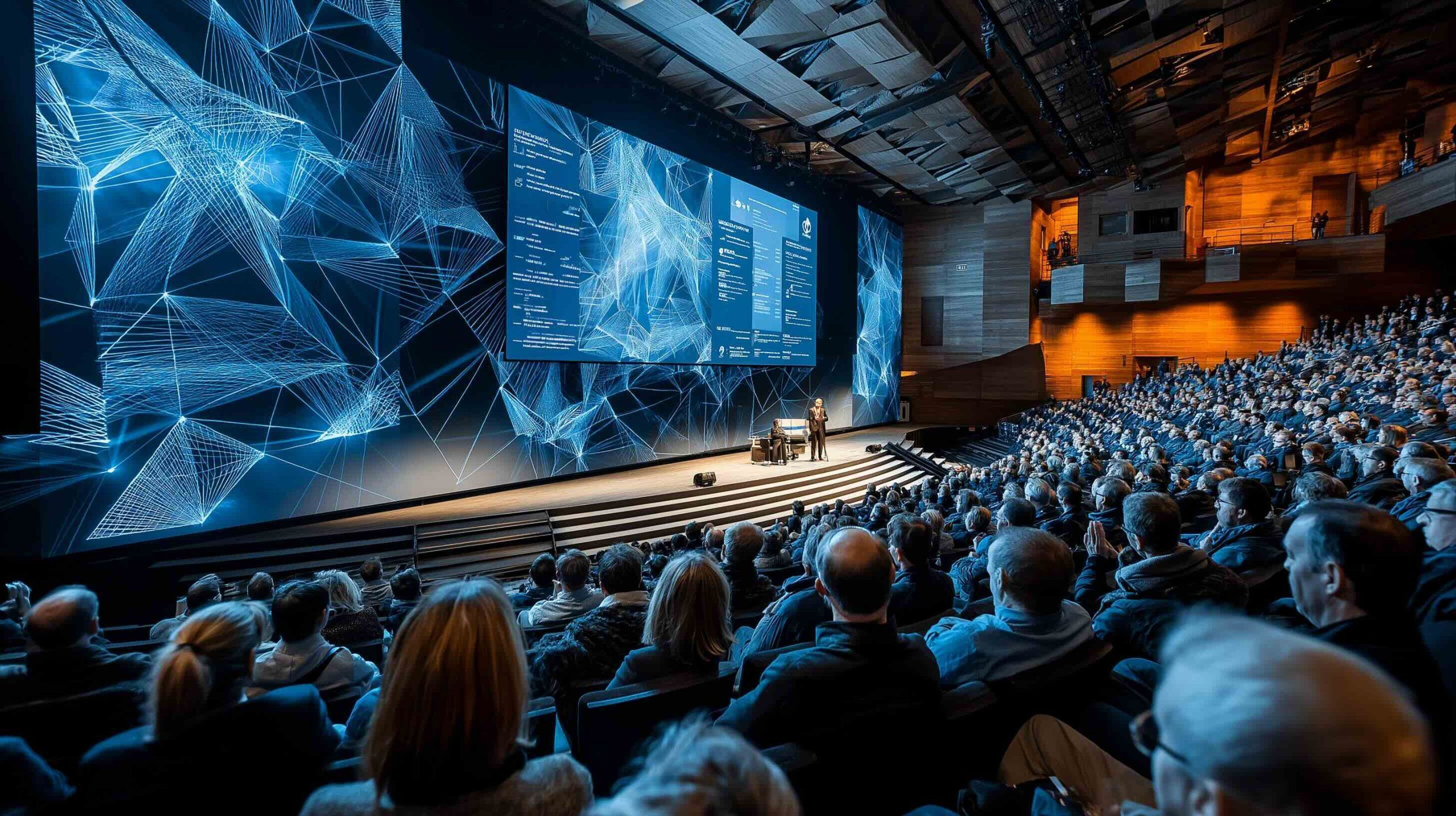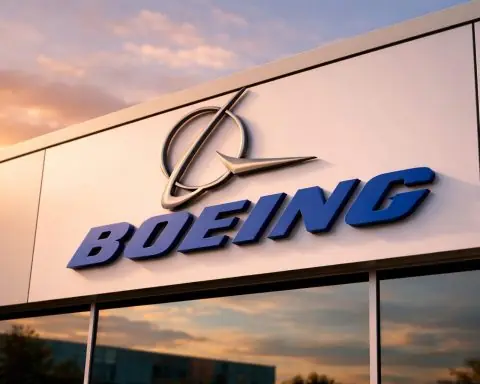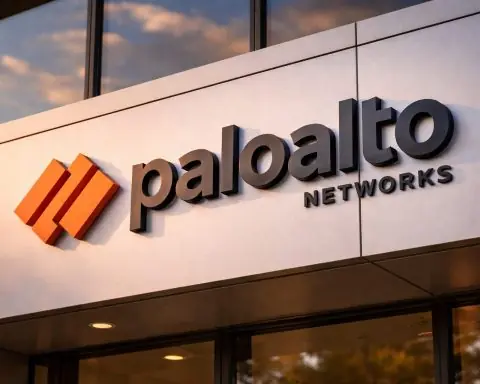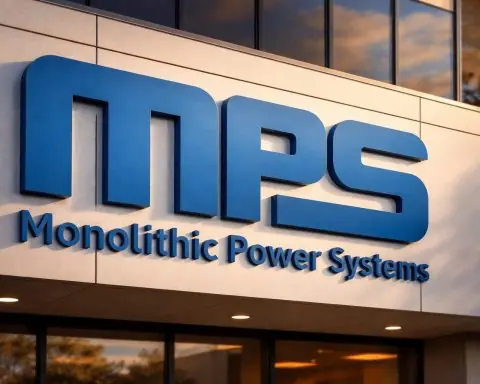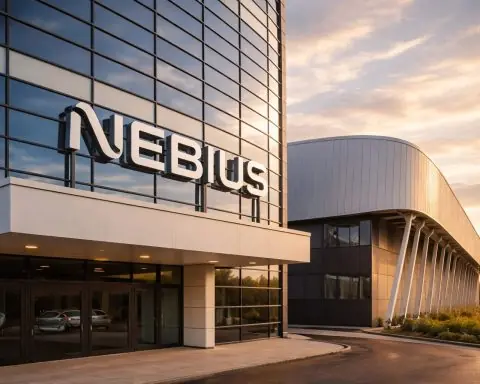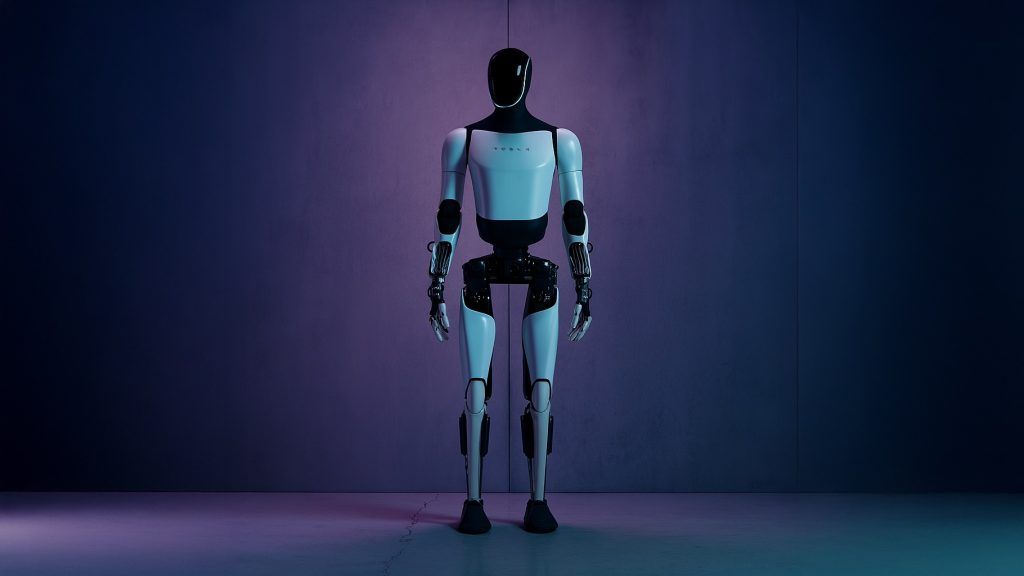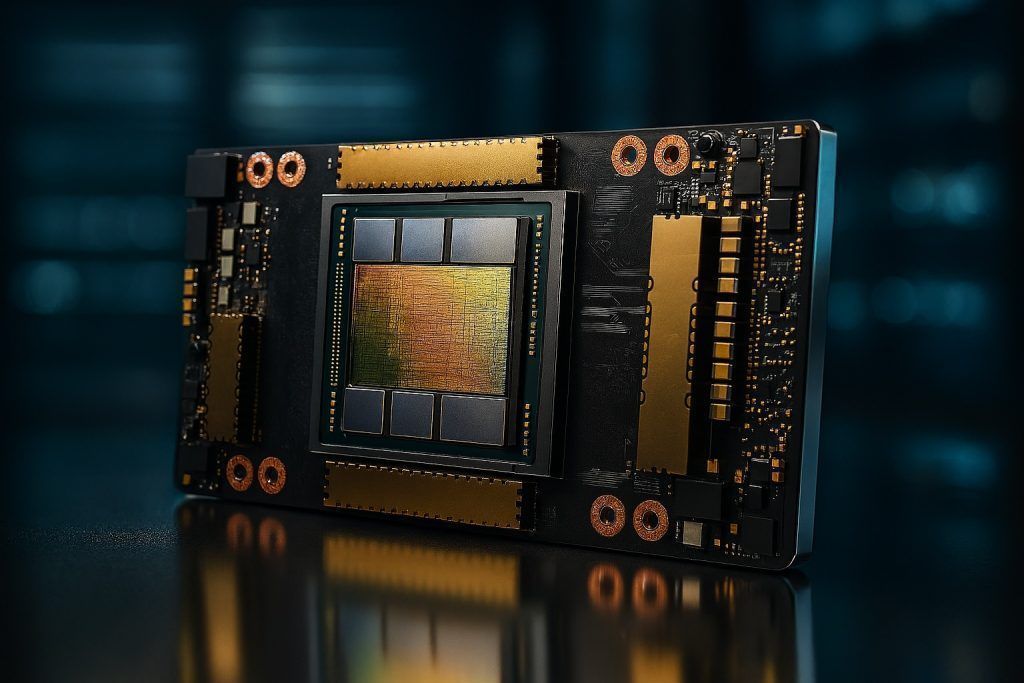- AAAI 2025 was held February 27–March 2, 2025 in Philadelphia, USA, and AAAI 2026 is scheduled for January 20–27, 2026 in Singapore.
- NeurIPS 2025 will be held December 10–15, 2025 in San Diego, USA, attracting over 13,000 participants.
- ICML 2025 takes place July 13–19, 2025 in Vancouver, Canada, with around 6,000 participants.
- ICLR 2025 is scheduled for April 24–28, 2025 in Singapore, marking the conference’s first return to Asia post-pandemic.
- IJCAI 2025 runs August 16–22, 2025 in Montréal, Canada, and IJCAI-ECAI 2026 will be a joint conference in Bremen, Germany, August 8–14, 2026, with about 2,500 attendees.
- CVPR 2025 takes place June 11–15, 2025 in Nashville, USA, with 7,500+ attendees.
- Ai4 2025 occurred August 11–13, 2025 at MGM Grand Las Vegas, drawing 8,000+ attendees and featuring 600+ speakers.
- Data + AI Summit 2025 in San Francisco (June 2025) is a four-day hybrid conference with over 700 sessions and attendees including JPMorgan Chase, FedEx, and Anthropic.
- World Summit AI 2025 took place October 8–9, 2025 in Amsterdam, attracting several thousand attendees and focusing on responsible AI and governance.
- AI for Good Summit 2025 in Geneva ran July 8–11, 2025 with 800+ speakers and about 10,000 attendees, and introduced the AI for Good Impact Awards with a $20,000 prize.
Comprehensive Comparison of AI Conferences and Awards 2025–2026
Artificial Intelligence has become a focal point of global gatherings in recent years, with an explosion of conferences, expos, and award events spanning academia, industry, and the public sphere. These events range from elite academic symposiums to massive trade shows and festivals open to all. Below, we present a comprehensive comparative report of the major AI conferences, exhibitions, shows, and awards in 2025 and 2026 – including their formats (in-person, hybrid, virtual), key themes, notable speakers, audiences, and evolving trends.
In summary: AI events in 2025–26 are truly global in reach and scale, serving as “vital hubs where [knowledge-sharing], networking opportunities and the cultivation of business partnerships” converge aimagazine.com. Across these events, generative AI and ethics/governance have emerged as dominant themes, and attendance is booming as AI moves into the mainstream.
Academic AI Conferences (Research-Focused)
Academic AI conferences are the bedrock for cutting-edge research dissemination. They typically require paper submissions and peer review, attracting researchers, practitioners, and students from around the world. These events are usually in-person (with hybrid options) and open to registered participants (primarily professionals and academics). Many feature workshops, tutorials, and competitions, and they often confer best paper awards or honors to groundbreaking work.
- AAAI Conference on Artificial Intelligence (AAAI): Among the premier general AI conferences. AAAI 2025 was held Feb 27–Mar 2, 2025 in Philadelphia, USA engine.com, and AAAI 2026 is scheduled for Jan 20–27, 2026 in Singapore aaai.org. With ~2,000 attendees engine.com, AAAI covers the full breadth of AI research – from machine learning and robotics to natural language processing and AI ethics engine.com. It features renowned AI scholars as keynote speakers engine.com and emphasizes both technical advances and societal impact. Notably, AAAI presents the AAAI Award for AI for the Benefit of Humanity (formerly the Squirrel AI Award) to honor positive-impact AI work. In 2025, this award (with a $25,000 prize) was given to Stuart J. Russell for his contributions to AI safety aaai.org. AAAI’s rotation to Singapore in 2026 also reflects the growing Asian involvement in AI research.
- NeurIPS (Conference on Neural Information Processing Systems): The largest machine learning conference globally, NeurIPS draws over 13,000 participants engine.com from academia and industry. NeurIPS 2024 was in Vancouver and NeurIPS 2025 will be Dec 10–15, 2025 in San Diego, USA engine.com. Its core topics are machine learning, deep learning, and neural network advances engine.com, but it also spans NLP, computer vision, reinforcement learning, etc. A NeurIPS paper acceptance is notoriously competitive, reflecting the field’s cutting edge. The conference includes hundreds of peer-reviewed papers and workshops on specialized topics. Big tech involvement is strong (e.g. NVIDIA and other AI leaders often present) engine.com. NeurIPS has become a barometer for AI research trends – for example, recent years saw many works on generative models and AI ethics.
- ICML (International Conference on Machine Learning): Another top-tier ML conference, held annually. ICML 2025 takes place July 13–19, 2025 in Vancouver, Canada engine.com, expecting around 6,000 participants engine.com. It focuses on the latest advances in machine learning algorithms, theory, and applications engine.com. ICML features eminent ML researchers as keynotes engine.com and covers topics from deep learning to optimization. Like NeurIPS, ICML is highly selective and attracts a mix of academic researchers and industry scientists (e.g. Google, Meta AI). The conference fosters collaboration between academia and industry, evidenced by workshops and tutorials that emphasize both rigor and real-world impact 1 .
- ICLR (International Conference on Learning Representations): A leading conference originally focused on deep learning and representation learning. In 2025, ICLR is scheduled for April 24–28, 2025 in Singapore engine.com (marking the conference’s first return to Asia post-pandemic). ICLR has grown rapidly in tandem with the deep learning boom – expect thousands of attendees and extensive discussion of generative AI (large language models), vision transformers, and other frontier DL topics. ICLR 2026 details are TBD (likely Spring 2026), but the trend is for continued global rotation and hybrid format availability.
- IJCAI (International Joint Conference on AI): A long-running global AI conference (since 1969) held roughly annually, often alternating continents. IJCAI 2025 is slated for August 16–22, 2025 in Montréal, Canada engine.com and IJCAI-ECAI 2026 will be a joint conference in Bremen, Germany (Aug 8–14, 2026) uia.org 10times.com. Attendance is ~2,500 engine.com. IJCAI covers a broad spectrum of AI research areas, from machine learning and planning to multi-agent systems and knowledge reasoning engine.com. It’s known for fostering interdisciplinary collaboration and bridging foundational research with real-world applications engine.com. Distinguished researchers deliver keynotes, and the event often rotates with the European Conference on AI (ECAI) – indeed, 2026’s edition is co-hosted with ECAI uia.org. This joint format underscores global cooperation in AI.
- CVPR (Conference on Computer Vision and Pattern Recognition): While technically focused on computer vision, CVPR is one of the largest AI-related academic events due to the vision field’s prominence. CVPR 2025 (June 11–15, 2025 in Nashville, USA) anticipates 7,500+ attendees engine.com. It features top experts in computer vision as keynote speakers engine.com and showcases advances in image/video analysis, pattern recognition, autonomous vehicles, and more engine.com. CVPR’s scale and industry presence (big tech and startups demo cutting-edge vision tech) make it influential. The conference also addresses issues like dataset bias and ethics in vision AI engine.com. (Similarly large are ICCV and ECCV in alternating years, but we focus on CVPR as the flagship annual vision event.)
- Other Notables:ECAI 2025 (the European AI Conference) will be in October 2025 in Bologna, Italywikicfp.com, focusing on Europe’s AI research community. AIES (AI, Ethics, and Society) is a specialized conference (AAAI/ACM sponsored) focusing on AI ethics – for example, AIES-2025 is set for October 2025 in Madrid aaai.org, reflecting the growing academic interest in ethical AI. In the robotics domain, ICRA (Int’l Conference on Robotics and Automation) is a top IEEE-sponsored event where AI intersects with robotics: ICRA 2025 (May 19–23, 2025) in Atlanta and ICRA 2026 (June 1–5, 2026) in Vienna will gather thousands of roboticists and AI researchersieee-ras.orgieee-ras.org to discuss autonomous systems and intelligent robots.
Academic events summary: These conferences are mostly in-person gatherings of professionals, often with virtual streaming options for keynotes. They are not public festivals; one typically needs to register (and often have an accepted paper or pay a fee) to attend. The target audience is researchers, PhD students, and R&D professionals. Geographically, they rotate across North America, Europe, and Asia, reflecting AI’s global nature. Notable speakers at these events include Turing Award laureates and AI pioneers – for instance, Andrew G. Barto and Richard S. Sutton, two pioneers of reinforcement learning, were named 2024 ACM Turing Award winners (announced in 2025) umass.edu and are exactly the kind of luminaries who often keynote or are celebrated at such conferences. Each conference also typically honors outstanding contributions (best paper awards, lifetime achievement awards, etc.), underscoring excellence in AI research.
Industry and Enterprise AI Summits
Complementing academic conferences, industry-oriented AI summits and trade shows in 2025–26 have proliferated. These events target enterprise leaders, practitioners in business, government officials, and investors. They focus on practical applications of AI, case studies, product demos, and networking (often facilitating partnerships and sales). Formats are usually in-person or hybrid, with paid passes for professionals (and sometimes free expo-hall passes). Many are large-scale and open to any professionals (not restricted by paper acceptance), making them accessible to a broader tech audience than academic conferences 2 .
- Ai4 (AI for Industry): Ai4 has quickly become one of North America’s largest AI industry conferences. Ai4 2025 was held Aug 11–13, 2025 at MGM Grand Las Vegas with 8,000+ attendees engine.com, and it’s branded as a convergence of Fortune 500 executives, tech innovators, and researchers. The conference boasts 600+ speakers and dozens of content tracks aimagazine.com covering AI use-cases in finance, healthcare, marketing, cybersecurity and more. In 2025, keynote speakers ranged from AI luminaries like Geoffrey Hinton (the “Godfather of AI”) to public figures like Andrew Yang engine.com, reflecting a mix of technical and popular appeal. Ai4’s emphasis is on practical, real-world AI applications at scale aimagazine.com, and it provides extensive networking and training workshops. By showcasing how enterprises are deploying AI (often with ROI case studies), Ai4 helps business leaders align on AI strategy. (For 2026, Ai4 is expected to continue in Las Vegas; its growing attendance underscores the surging enterprise interest in AI.)
- The AI Summit (London & New York): A series of events under the AI Summit banner targets enterprise adoption of AI. AI Summit London – part of London Tech Week each June – draws about 4,500 tech and business professionals aimagazine.com. The 2025 edition (10th year of the summit) featured eight stages covering topics like sustainable AI innovation, data excellence, and responsible AI deployment aimagazine.com. It is known for immersive demos and networking with industry leaders, supported by major sponsors (HP, IBM, Google Cloud, etc.) aimagazine.com. Meanwhile, AI Summit New York (Dec 2025) caters to the North American audience, providing C-suite executives with strategies for AI-driven business transformation innovationleader.com innovationleader.com. These summits often host the AIconics Awards ceremony (see Awards section) to recognize AI excellence in industry newyork.theaisummit.com. The target audience is technology executives, corporate innovation leaders, and policymakers looking to scale AI in organizations. The format is typically in-person, with multi-track content and expo floors. Notably, the AI Summit series (organized by Informa) also partners with other tech events (e.g., one summit runs alongside Black Hat USA for AI in cybersecurity), highlighting AI’s convergence with other sectors 3 .
- Data + AI Summit: Hosted by Databricks, this event (formerly Spark+AI Summit) spotlights the intersection of big data and AI. Data + AI Summit 2025 (June 2025 in San Francisco) was a four-day hybrid conference featuring over 700 sessions aimagazine.com and hands-on workshops. It attracts a global audience of data engineers, data scientists, and AI practitioners. Key themes include data engineering, machine learning pipelines, LLMs, and data governance aimagazine.com – reflecting the need to manage and leverage data for AI. In 2025, speakers included executives from JPMorgan Chase, FedEx, and startup Anthropic aimagazine.com, underscoring the blend of enterprise and cutting-edge AI research perspectives. The summit’s popularity (thousands attending in person and many more online) shows the demand for AI knowledge in the data industry. The 2026 edition is likely to be similar, with both in-person and virtual options aimagazine.com, continuing to serve as a training and networking hub for the data/AI community.
- World Summit AI: A global industry summit held annually in Amsterdam (part of the Inspired Minds series). World Summit AI 2025 (Oct 8–9, 2025) convened leaders from corporate, government, and AI research to discuss AI strategy, enterprise adoption, risks, and governance innovationleader.com. It typically attracts several thousand attendees from around the world. Main themes include responsible AI, regulatory policy, and the future of AI across industries aimagazine.com. For example, sessions cover ethics and AI governance frameworks to foster an “inclusive and equitable global AI market” aimagazine.com. Speakers often include Fortune 500 tech executives, policymakers, and AI pioneers. The event’s global outlook and mix of attendees (enterprise, startups, VCs, academia) aim to “shape the global AI agenda” aimagazine.com. By 2025, World Summit AI has firmly established itself as a key meeting point bridging private sector innovation and public sector considerations on AI. (Expect World Summit AI 2026 to continue in Amsterdam with similar scale, given the consistent annual schedule.)
- Generative AI and New Summit Brands: The generative AI boom of 2023–2024 has given rise to new conferences by 2025 focusing on this subfield:
- GAI World 2025 (Generative AI World) in Boston (Sept 29–30, 2025) is a new premier event specifically on GenAI in production, offering case studies from enterprises like Saks, UBS, Pfizer on deploying large language models innovationleader.com innovationleader.com. It targets senior business and technical execs, reflecting how generative AI became a boardroom topic.
- Imagination in Action (Sept 2025, Palo Alto) – a program of short TED-style AI talks by Stanford professors and tech leaders (e.g., from NVIDIA, Waymo, Anthropic) innovationleader.com. This reflects increasing community and thought-leadership meetups around AI.
- HumanX Conference: Launched in 2024, HumanX 2025/2026 aims to be a high-end gathering of AI startups, investors, and corporate tech buyers. In 2025 it was in New York; in April 2026 it moves to San Francisco to expand its reach innovationleader.com aimagazine.com. Co-founded by industry veterans, HumanX differentiates by offering “intimate, focused sessions” and curated networking (e.g. SolutionBridge, VentureConnect programs) to facilitate partnerships and investment deals aimagazine.com. It targets C-level executives and AI builders, and speakers in 2025 included leaders from OpenAI, Amazon, Google Cloud, etc. aimagazine.com. The rise of HumanX exemplifies the trend of exclusive AI executive retreats focusing on practical collaboration.
- SuperAI Conference: Debuting in Singapore, SuperAI 2025 (June 2025) drew over 7,500 attendees aimagazine.com, aiming to bridge Eastern and Western AI ecosystems. Organized by the team behind the crypto event Token2049, it featured keynotes, panels, a startup competition and even a hackathon aimagazine.com. Topics spanned robotics, healthcare AI, finance and more aimagazine.com. Notably, prominent figures like Emad Mostaque (Stability AI founder) and tech investors participated aimagazine.com. SuperAI’s partnerships with Microsoft, Google, AWS, and others show big tech support aimagazine.com. This conference demonstrates how Asia is emerging as a major AI conference hub, with Singapore positioning itself as a meeting point for global AI leaders. We anticipate SuperAI 2026 to continue the momentum, likely tied to Singapore’s growing AI industry.
- Regional Enterprise Events: Many regions now host their own AI-in-business conferences:
- AI & Big Data Expo – a global series with editions in Europe, North America, and beyond. For example, AI & Big Data Expo Europe 2025 in Amsterdam (Sept 24–25, 2025) gathered ~8,000+ tech leaders and showcased 150+ speakers and live demos innovationleader.com. It focuses on enterprise adoption, responsible AI, and sector-specific digital transformation (with speakers from companies like IKEA and Lloyds Bank) innovationleader.com. These expos are often co-located with IoT, Cloud, and Cybersecurity expos, attracting a diverse IT audience aimagazine.com aimagazine.com. Similarly, AI & Big Data Expo North America 2026 is slated for May 2026 in San Jose, emphasizing real-world AI and data solutions for thousands of decision-makers 4 .
- Enterprise AI Summit Europe 2026 (Munich, Mar 16–17, 2026) – a conference for about 400+ attendees to exchange applied AI case studies, featuring speakers from companies like Volkswagen and Google innovationleader.com. This indicates Europe’s thriving B2B AI event circuit.
- Ai Everything Global: Hosted in the UAE, this has been a significant Middle East AI industry event. After previous editions in Dubai, AI Everything Global 2026 is planned for Abu Dhabi (May 2026) with an anticipated 35,000+ visitors and 1,200+ AI startups & tech companies from 70+ countries aimagazine.com aimagazine.com. It’s positioned as a world-leading summit accelerating the global AI economy – effectively the region’s answer to a World Fair for AI. High-level policy dialogue, industry showcases, and startup pitches are all part of the agenda aimagazine.com. The large attendance (including many Chief AI Officers and investors) underscores the Middle East’s investment in AI leadership 5 .
- GITEX (AI tracks): While not exclusively an AI conference, GITEX Global (Dubai’s giant tech show every October) now heavily features AI. GITEX 2025 (Oct 13–17, 2025) at Dubai World Trade Centre expected around 18,000+ attendees in AI-related sessions engine.com (out of 100k+ overall visitors). The event included AI-focused sub-exhibitions (like AI Everything in prior years) and keynotes from government AI ministers and industry CEOs engine.com. GITEX serves both professionals and the tech-curious public, showcasing AI in smart cities, mobility, healthcare, etc. The presence of figures like H.E. Omar Sultan Al Olama (UAE’s AI Minister) as keynotes engine.com highlights the strategic importance placed on AI by governments in the region.
Industry summit summary: These events are primarily for professionals and enterprises, with in-person formats (often supplemented by online streaming). They attract anywhere from a few hundred (specialized or new events) to tens of thousands (major expos) of attendees. The target audience ranges from C-suite executives and IT managers to startup founders and AI engineers, depending on the event. Key themes across industry events in 2025–26 include practical AI deployment, ROI and case studies, generative AI in business, AI ethics & governance (especially in regulated industries), and sector-specific AI innovations (finance, healthcare, retail, etc.). Notable speakers are often industry heavyweights (CEOs of AI companies, tech thought leaders, prominent investors) and sometimes leading researchers who can speak to business impact (e.g., Andrew Ng spoke at HumanX 2026 innovationleader.com). Many summits also feature government regulators or policymakers on panels, acknowledging the growing role of policy in AI deployment innovationleader.com. Networking is a major component – with expo halls for vendors, and matchmaking programs for startups and investors (e.g., HumanX’s VentureConnect) aimagazine.com. Unlike academic conferences, these summits are less about publishing new research and more about knowledge exchange, product showcasing, and forging partnerships.
Public AI Exhibitions and Tech Shows
A distinct category of AI events are the large-scale exhibitions, festivals, and tech shows that are open to the public or broad tech audiences. These blend technology showcases with high-profile talks and often have a festival-like atmosphere. Many are in-person with significant media presence, and some offer free entry (or affordable tickets) to encourage widespread attendance.
- AI for Good Global Summit: Organized by the UN’s ITU agency, this summit is unique in its mission-driven focus on AI for social good and its open accessibility. AI for Good 2025 took place July 8–11, 2025 in Geneva, Switzerland as a free hybrid event open to both in-person and online attendees medium.com. It expanded to four days (from two in 2023) and featured over 800 speakers and 10,000 attendees, including global leaders from government, industry, policy, and social sectors medium.com. The summit combines high-level keynotes, workshops, and an open expo of AI projects (notably a robotics exhibition with humanoid and assistive robots). Key themes are aligned with sustainable development goals – e.g. AI for healthcare, climate, education, and AI ethics/governance dialogues. In 2025, speakers included Marc Benioff (Salesforce CEO), Yann LeCun (Meta’s Chief AI Scientist), and Geoffrey Hinton, among others medium.com medium.com. ITU Secretary-General Doreen Bogdan-Martin set an optimistic, inclusive tone in her remarks medium.com. Notably, 2025 introduced the first-ever AI for Good Impact Awards to celebrate AI solutions benefiting humanity medium.com (with awards in categories like AI for People, Planet, Prosperity, etc.). Also, an Innovation Factory startup pitch contest awarded a $20,000 prize to an AI social innovation medium.com. The entire summit underscores global collaboration – it’s a melting pot of tech experts, NGOs, and policymakers. Looking ahead, AI for Good 2026 is expected to continue in Geneva (likely mid-2026) to further scale these efforts, solidifying this event as the leading public-interest AI summit.
- CogX Festival: Hosted annually in London (with recent expansion to other cities), CogX is one of the largest tech festivals focused on AI and emerging technology. It blends conference content with a trade show and public festival vibe. Recent CogX events have drawn on the order of tens of thousands of attendees – approximately 90,000 in the latest editions engine.com – including industry leaders, policymakers, researchers, and the general public. Traditionally held in London’s O2 arena or King’s Cross tech district, CogX covers how AI and related tech impact industry, government, and society engine.com. It features influential keynote speakers (tech CEOs, global thought leaders, even celebrities), and topics range widely: AI in healthcare, ethical AI, future of work, etc. Notably, CogX also has an awards program recognizing startups and innovations across AI categories (the CogX Awards). In 2024, CogX launched a U.S. edition in Los Angeles engine.com, and for 2025 it planned a Los Angeles event on May 7, 2024 as a debut there engine.com, indicating a growing transatlantic presence. The format is in-person and ticketed (open to anyone who purchases a pass, from students to execs), with content on multiple stages and an expo. CogX’s growth reflects public appetite for AI knowledge and networking beyond specialist circles. Expect the CogX 2025 main festival (likely in London in fall 2025) to continue drawing a broad audience, and perhaps further international spin-offs by 2026.
- Web Summit (Lisbon) – AI Track: Web Summit is a massive global tech conference (70,000+ attendees from 170+ countries) aimagazine.com covering everything in tech, not just AI. However, in recent years AI has been a centerpiece of discussions there. At Web Summit 2025 (Nov 2025 in Lisbon), numerous talks and panels were dedicated to AI topics (from startups using AI to ethics and regulation), featuring speakers from Microsoft, Google, Meta, and leading AI startups aimagazine.com aimagazine.com. Web Summit’s scale and media attention make it a barometer for tech trends – and AI’s prominence at the event shows its centrality to the tech landscape. The event is open to the public (with paid tickets) and targets a mix of startups, investors, media, and tech enthusiasts. By convening such a diverse crowd, Web Summit facilitates global conversations on the future of AI in society. (Note: There was some leadership controversy at Web Summit in late 2023, but by 2025 the event continued strongly in Lisbon.) For 2026, Web Summit is expected again in Lisbon (unless plans change) and will undoubtedly highlight AI advances and policy developments of the year.
- Consumer Electronics Show (CES): CES in Las Vegas (held every January) is the world’s largest consumer tech show, and while it’s not an AI-specific event, AI has become one of the dominant themes of the expo. At CES 2025 (Jan 2025) and the upcoming CES 2026 (Jan 6–9, 2026), hundreds of exhibitors are showcasing AI-powered products – from smart home devices and autonomous vehicles to AI-driven health gadgets. This massive trade show (attendance in the hundreds of thousands) offers a glimpse of how AI is integrated into consumer products globally innovationleader.com innovationleader.com. Tech companies often use CES to unveil their latest AI innovations (e.g., smarter robots, AI assistants, or chipmakers announcing new AI chips). The audience is a mix of industry professionals, media, and analysts (CES is not generally open to casual public walk-ins, but its influence on public markets and consumers is huge). CES 2025’s highlights included many generative AI applications in software, automotive AI (self-driving demos), and AI in entertainment. CES provides a contrast to the more academic or B2B events – it’s about practical, consumer-facing AI and is a bellwether for which AI trends are hitting the market.
- World Robot Conference (WRC): China hosts the World Robot Conference in Beijing, which by its 10th edition in 2025 has become a major international expo on robotics and AI. WRC 2025 was scheduled for Aug 8–12, 2025 in Beijing wfeo.org, featuring four major sections: forums, an exhibition, competitions, and themed events globalomp.com. The expo showcases state-of-the-art robots (industrial robots, service robots, humanoids, etc.) and AI systems, drawing researchers, companies, and a broad public audience. Thousands attend to see robot demonstrations (from dancing robots to surgery robots) and hear talks on advancements in robotics and automation. There is also an academic component: the WRC includes a Symposium on Advanced Robotics and Automation for scholarly exchange worldrobotconference.com. With China’s strong national push in AI and robotics, WRC has high-level support and often features product launches from Chinese tech companies and universities. It’s open to the public (with ticketing) and is akin to a world fair for robotics. WRC 2026 will likely occur in August 2026 in Beijing as well, continuing the tradition. This event highlights the robotics side of AI, emphasizing tangible innovations and public engagement (families and students attend to marvel at robots).
- Regional Tech Expos with AI Focus:
- In the Middle East, apart from GITEX and AI Everything (mentioned above), there are events like the Global AI Summit in Riyadh, Saudi Arabia (previously held in 2022) and likely to recur by 2026, given the region’s keen interest in AI leadership.
- In North America, events like South by Southwest (SXSW), while not purely AI, have in 2025–26 heavily featured AI panels and art/tech installations (for instance, generative AI in music and film at SXSW).
- Europe saw in 2025 the AI Summit segment within TechEU Summit and other festivals combining AI with broader innovation (e.g., VivaTech 2025 in Paris had significant AI startup showcases).
These public-facing events often involve interactive exhibits, live demos, and broader discussions that include non-technical aspects (ethics, art, society). They tend to be hybrid or in-person; many were quick to adopt virtual components during the pandemic and have maintained them (AI for Good, for example, retained a strong online community year-round medium.com). The key themes here overlap with those in other events but are communicated in more accessible ways – e.g., “How AI can tackle global challenges” (AI for Good) or “AI-powered products that will change your home” (CES). Notable speakers can include not just technologists but also public figures and artists (for instance, musicians or authors discussing AI creativity at festivals, politicians talking about AI governance, etc.). The target audience is often the general public, tech enthusiasts, students, startup founders, and policymakers all under one roof, fostering cross-pollination of ideas.
AI Awards and Recognitions (2025–26)
Beyond conferences and expos, the AI community has a growing number of award programs recognizing excellence – whether in research breakthroughs, innovative products, or social impact. These awards are often presented at events or via dedicated ceremonies, and they highlight notable winners and trends in AI.
- AAAI’s Award for AI for the Benefit of Humanity: As mentioned, the AAAI Conference includes a high-profile award (initially funded as the Squirrel AI Award with a $1 million prize in early years, now continued by AAAI). In 2025, Stuart J. Russell was honored for his work in AI safety and human-compatible AI aaai.org. This award, sometimes nicknamed the “Nobel Prize of AI,” underscores the field’s value-oriented achievements. The 2024 winner (awarded at AAAI 2024) was Yoshua Bengio (for AI for good in climate and health), and we can expect the 2026 award to be announced at AAAI-26 in Singapore, continuing to showcase AI’s positive impact. AAAI also bestows classic honors like Fellowships and Distinguished Service Awards to esteemed AI researchers 6 .
- ACM Turing Award: While not exclusive to AI, the Turing Award is the highest honor in computer science. Many recent Turing laureates have been AI pioneers. In 2024, Andrew G. Barto and Richard S. Sutton received the Turing Award (announced March 2025) specifically “for developing the conceptual and algorithmic foundations of reinforcement learning”, a core AI paradigm umass.edu. This highlights how fundamental AI research is being recognized at the pinnacle of computing honors. Any Turing Award announcements in 2025 (for 2025’s award, revealed in 2026) will be closely watched by the AI community – if it goes to another AI luminary, it will further mark the era of AI. Turing Award winners often give lectures at events like the Heidelberg Laureate Forum or major AI conferences, inspiring the next generation.
- AI for Good Impact Awards: Launched at the 2025 AI for Good Summit, these awards celebrate AI projects aligned with sustainable development. In July 2025, 12 finalists across 4 categories (AI for People, Planet, Prosperity, and a special Pro Bono Tech category) were honored medium.com. The winners – such as a project using AI to discover new drug therapies (Every Cure, which won Newsweek’s “AI Impact Award” overall) newsweek.com – show AI’s humanitarian potential. The awards ceremony took place in Geneva with much fanfare, and it’s expected to become an annual fixture. For instance, AI for Good 2025’s winners included innovations like an AI tool for sustainable agriculture and an AI-driven healthcare solution in the Global South (as highlighted in summit coverage). These awards often come with recognition rather than large cash prizes (aside from the pitch competition’s $20k). By 2026, we anticipate a second edition, possibly expanded, continuing to incentivize “AI for good” initiatives.
- The AIconics Awards: One of the first global award programs for AI in industry, the AIconics have been running for several years and are typically aligned with the AI Summit series. In 2025, the AIconics North America took place at AI Summit New York (Dec 2025), and a Global edition often occurs in London. Award categories include “AI Solution Provider of the Year,” “AI Implementer of the Year,” “Young AI Innovator of the Year,” and “Outstanding Contribution to AI”, among others newyork.theaisummit.com newyork.theaisummit.com newyork.theaisummit.com. These categories split recognition between companies and individual contributors. For example, a startup that delivered exceptional AI solutions might win Provider of the Year, while a large enterprise that adopted AI at scale could win Implementer of the Year newyork.theaisummit.com. The Outstanding Contribution category often honors an individual with a decade+ of impact in AI newyork.theaisummit.com. Winning an AIconics is considered prestigious in the business community – it positions the winners as industry thought leaders newyork.theaisummit.com. Winners get to speak on a “Winners Panel” on the Summit’s main stage and receive passes to other AI Summit events newyork.theaisummit.com newyork.theaisummit.com. Past AIconics winners have included companies like DeepMind, IBM Watson, and innovative startups. We expect the 2026 AIconics to continue, likely introducing new categories reflecting current trends (e.g., an award for Generative AI innovation or AI Ethics initiative).
- National and Regional AI Awards: Across different countries, specialized AI award programs have emerged:
- In the UK, the AI Awards 2025 (hosted by a tech events group) held a gala on April 23, 2025, celebrating “the brightest minds and most innovative companies” softwaretesting.news. Categories and winners illustrate enterprise adoption of AI. For example, Ernst & Young (EY) won “Best AI for Sustainable Development” theaiawards.co.uk, and Lloyds Banking Group’s Digital Experience Lab won “Best AI Usage in Finance” theaiawards.co.uk. An AI startup (CPL Aromas & Quinnox) was the Overall Winner of AI Awards 2025 theaiawards.co.uk. There were also awards for AI in Telecommunications (won by Liberty Latin America & Sogeti) theaiawards.co.uk, Best Use of Machine Learning in Business (won by Xoriant) theaiawards.co.uk, and even individual honors like “AI Champion of the Year” theaiawards.co.uk. The National AI Awards 2025 (UK) were held in October 2025 in Ipswich, featuring categories across industries (AI in Business, AI in Education, AI for Public Sector, etc.) thenationalaiawards.com thenationalaiawards.com – indicating government and industry collaboration to highlight local AI success stories.
- In the US and globally, the AI Breakthrough Awards 2025 (an annual program by Tech Breakthrough) recognized dozens of category winners, such as “Machine Learning Company of the Year,” “Best Conversational AI Solution,” “Computer Vision Innovation Award,” etc. For instance, a company like One Model won “Ethical AI Solution of the Year 2025” onemodel.co, and numerous AI startups proudly announced their category wins (e.g., “AI Platform Innovation” or “Generative AI Platform of the Year” etc.). These awards don’t involve ceremonies on the scale of others; rather, winners are announced via press and can tout the accolade ir.bitdeer.com. Nonetheless, they reflect which technologies and firms are leading in various AI niches.
- There are also sector-specific awards, like AI in Healthcare awards, AI in Finance awards, often given at specialized conferences or by industry bodies. For example, the AI in Financial Services Global Awards 2025 highlighted AI-driven fintech innovations.
- Lastly, academic conferences themselves give awards: e.g., best paper awards at NeurIPS/ICML, best demo or best challenge results, and early career medals. While too numerous to list, these are noted within those communities and often signal rising stars or breakthroughs (for example, NeurIPS 2025 might give an Outstanding Paper Award to a new state-of-the-art model in computer vision).
Awards summary: The proliferation of awards in 2025–26 shows a maturation of the AI field – excellence is being formally recognized across research, applications, and ethical practice. Awards come from prestigious bodies (ACM, AAAI), international organizations (ITU), and private sector or media entities (AI Summit’s AIconics, AI Breakthrough). Notable winners span from eminent scientists like Sutton & Barto (Turing Award) to enterprises like EY and Lloyds (industry awards) to nonprofit initiatives (AI for Good winners). The criteria for these awards vary: some reward technical innovation, others social impact or successful implementation. For instance, the AI Awards UK explicitly look at how AI was integrated and its measurable outcomes thenationalaiawards.com thenationalaiawards.com. These recognitions not only honor achievements but also indicate trends – e.g., multiple awards for ethical AI solutions in 2025 onemodel.co suggest a growing emphasis on responsible AI deployment.
Trends and Evolution (2025 vs. Past & Looking to 2026)
Across the landscape of AI events in 2025–2026, a few key trends and evolutionary changes stand out, especially when compared to prior years:
- Unprecedented Growth in Scale and Number of Events: AI events are bigger than ever. Flagship conferences have grown in attendance (e.g. NeurIPS, ICML now exceed 6k–13k attendees, whereas a decade ago they were a fraction of that). New events have sprouted worldwide – from regional summits to niche workshops on hot topics (like generative AI). The AI for Good Summit illustrates this growth: from a “small gathering of a few hundred experts in 2017” to 10,000 attendees in 2025 medium.com. Similarly, industry events like Ai4 and AI Summit have seen rising registration as AI becomes a must-have initiative for companies. Even trade shows (CES, GITEX) have allocated more floor space to AI products. This trend suggests that AI is no longer confined to specialist circles; interest is coming from virtually every sector, driving event expansion.
- Hybrid and Virtual Formats – Increased Accessibility: The pandemic in 2020 forced AI conferences to go virtual, and many lessons were learned. In 2025–2026, most events returned to primarily in-person, but nearly all offer hybrid participation. For example, AI for Good is free and streams all main stage content online, attracting a global virtual audience in addition to those in Geneva medium.com. The Data + AI Summit allowed virtual attendance for its 700+ sessions aimagazine.com. Academic conferences like ICLR and ICML continue to provide virtual paper presentation platforms alongside physical meetings (which also helps inclusivity for those who can’t travel). This hybrid model means the reach of these events is broader than the on-site headcounts – tens of thousands more may tune in online. Additionally, some events have spun up year-round webinar series or online communities (the AI for Good “Neural Network” community hosts 150+ online events yearly to complement the summit medium.com). The evolution here is that AI knowledge-sharing is becoming continuous and multi-modal, not just a once-a-year physical meetup.
- Generative AI Mania and New Focus Areas: The breakthrough of large language models and generative AI (like GPT-4 in 2023) heavily influenced 2025’s event agendas. Many conferences added generative AI tracks, panels, and demos. We saw dedicated events (Generative AI Summit London 2025, etc.) and existing conferences adjusting content – e.g., at academic conferences, papers on diffusion models, transformers, and multimodal generative AI were front and center. Business conferences had sessions on how to leverage GPT models in enterprise, and many expo demos involved generative AI in products (from creative AI tools to code generation). This is a shift from previous years where “AI” in conferences might have been more about predictive analytics or vision; now conversational AI and content generation are star attractions. We also see AI ethics and safety remain a crucial theme – likely reinforced by the rise of genAI. Many events, from World Summit AI to Web Summit and AAAI, featured discussions on AI governance, regulation, and ethical frameworks to address concerns around powerful AI systems aimagazine.com engine.com. Another focus area gaining ground is AI in climate and sustainability, often highlighted at “AI for Good” style events and even industry talks (companies showcasing AI for energy efficiency, etc., as seen at Energy industry events 7 ).
- Convergence of Audiences (Academia, Industry, Government, Public): There’s a notable blurring of lines in some events. Policymakers and regulators are increasingly present even at industry or academic conferences, reflecting the need for multi-stakeholder dialogue on AI’s impact. For instance, World Summit AI 2025 included policymakers and defense officials alongside tech CEOs innovationleader.com. Academic conferences like NeurIPS have workshops on policy, and regulators attend to understand the tech. On the flip side, entrepreneurs and corporations attend academic conferences scouting talent and ideas. Public festivals like CogX or AI for Good bring researchers and executives to a stage accessible to the general public. This convergence is building a more interdisciplinary and inclusive AI community, acknowledging that AI’s challenges and opportunities span technology, ethics, governance, and society. An example quote capturing this spirit was Web Summit’s recognition that it gathers “startups, investors, media and tech leaders… shaping the future of technology” aimagazine.com – a mix that now invariably involves AI.
- Regional Expansion and Specialization: Compared to past years (say 2018–2019 when most big AI conferences were US or Europe-based), 2025–2026 events are truly worldwide. Asia in particular has more top events (ICLR Singapore, AAAI Singapore, SuperAI in Singapore, IJCAI in China 2027 perhaps, etc., and huge expos in China like WRC). The Middle East, as noted, is heavily investing in marquee events (Ai Everything, GITEX, Saudi’s initiatives). Africa and Latin America are also holding AI weeks and smaller summits (e.g., Deep Learning Indaba in Africa continues annually as a pan-African AI workshop, though smaller in scale). This geographic broadening means more localized AI conversations (tailoring to regional industries or policy needs) and also a bit of competition among cities to host the “best” AI events. For instance, Singapore positioning itself as an East-West hub with SuperAI and international conferences, or Dubai/Abu Dhabi vying to host the largest AI expo. We also see some specialization: events focusing on subdomains (e.g., conversational AI conferences callcentrehelper.com targeting chatbot and call center AI) or industries (AI in medicine summits, AI in finance forums). This reflects the deepening of AI into various fields, requiring dedicated gatherings.
- AI Awards Highlight Responsible and Innovative AI: The fact that awards categories now explicitly include things like “Ethical AI Solution of the Year” onemodel.co and “AI for Good” categories shows a trend: value-based recognition. It’s not just about the most performant algorithm, but also about impact and responsibility. The AAAI award and AI for Good awards magnify this. At the same time, industry awards are encouraging competitive spirit in innovation (with many startups proudly advertising their wins). Over 2018–2020, such awards were fewer; by 2025, every major conference or media has its awards. This trend might continue with perhaps an AI “Oscars” style event someday, given how mainstream AI has become.
In conclusion, the years 2025 and 2026 mark a pivotal period in the AI ecosystem’s event calendar: the community and industry have rallied around numerous platforms to learn, showcase, and reward AI advancements. From academic conferences where “acceptance is a significant achievement” engine.com to open expos where the public can interact with robots, these events collectively drive forward the knowledge and adoption of AI. The evolution compared to past years is stark – larger audiences, more diverse stakeholders, and deeper discussions on not just how to build AI, but how AI should benefit humanity. As one industry writer aptly noted, events serve as “invaluable platforms for knowledge dissemination, networking…and business partnerships” aimagazine.com in this fast-moving field. Heading into 2026, we can expect AI conferences and awards to continue growing in prominence, mirroring AI’s own trajectory as a transformative force across society.
Sources:
- Engine, “Biggest AI Conferences & Events in 2025” – detailed list of 2025 AI events (locations, dates, topics, attendance) engine.com 8 .
- Innovation Leader, “Top AI Conferences and Trade Shows for 2025–2026” – enterprise-focused event rundown innovationleader.com 9 .
- AI Magazine, “Top 10 AI Events” (Apr 2025) – insights on leading global events and their themes aimagazine.com 10 .
- StartingUpGood (Medium), “Guide to AI for Good Summit 2025” – highlights of AI for Good 2025 (scale, speakers, awards) medium.com 11 .
- AAAI and IJCAI official announcements – AAAI-25 and AAAI-26 details engine.com aaai.org; IJCAI-ECAI-26 announcement 12 .
- News releases – ACM announcement of 2024 Turing Award (Barto & Sutton) umass.edu; AAAI award announcement (Russell 2025) 13 .
- AI Awards sites – The AI Awards (UK) 2025 winners theaiawards.co.uk theaiawards.co.uk; AIconics Awards 2025 categories (AI Summit NYC) newyork.theaisummit.com 14 .
- Additional event info – Ai4 2025 highlights engine.com; Ai Everything Global 2026 preview aimagazine.com; World Robot Conference 2025 notice wfeo.org; AI & Big Data Expo Europe description 15 .
